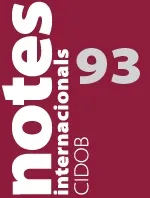A new Russian Conservatism: Domestic Roots and Repercussions for Europe

Notes internacionals CIDOB, núm. 93
Russia's reaction to the Maidan revolution in Ukraine and the subsequent critical deterioration of relations between Moscow and the West have reignited the otherwise diminished interest to the whole Eastern Europe all across the world. Most of politicians and experts in Europe and North America have admitted that the Russian military pressure against Ukraine was an "eye-opening surprise" for their governments, who underestimated the strength of neo-imperial momentum in Kremlin's strategy. Henceforth, professional community faces a challenge of properly understanding Russian intentions and policies, and translating the possible explanations into a policy relevant language.
Perhaps, the most intriguing question that is often asked in this respect is how consistent Russian international policies are. Indeed, the Kremlin has started its interference in Ukraine in February 2014 even without waiting for the closure of the Sochi Olympics, an exorbitantly costly project aimed at improving Russian image in the West and allegedly intended to capitalize on Russia's soft power resources. These intentions were apparently ruined by the absorption of Crimea followed by the crisis in Russia's relations with the West, including Russia's expulsion from the G8, the cancellation of "business-as-usual" relations between major Western powers and Moscow, sanctions against top Putin's loyalists, and the freezing of many diplomatic tracks.
Therefore, in the West the annexation of Crimea is widely perceived as a rupture with the previous Russian policies. Yet the Russian government perceives its action in Ukraine as a continuation rather than a cancellation of its previous efforts to "rise from the knees". In this paper this continuity will be interpreted through the analysis of a conservative turn in Russian domestic and foreign policies that became the key concept for Vladimir Putin’s third term in office. It is through this prism that we explain the common denominators of Russia's soft and hard power policies - from the Olympic Games held in Sochi to the territorial appropriation of the Ukrainian peninsula of Crimea. In the second part of this analysis we find out the most consequential effects of Russia’s current policy toward Ukraine for Russia – EU relations.
E-ISSN: 2013-4428